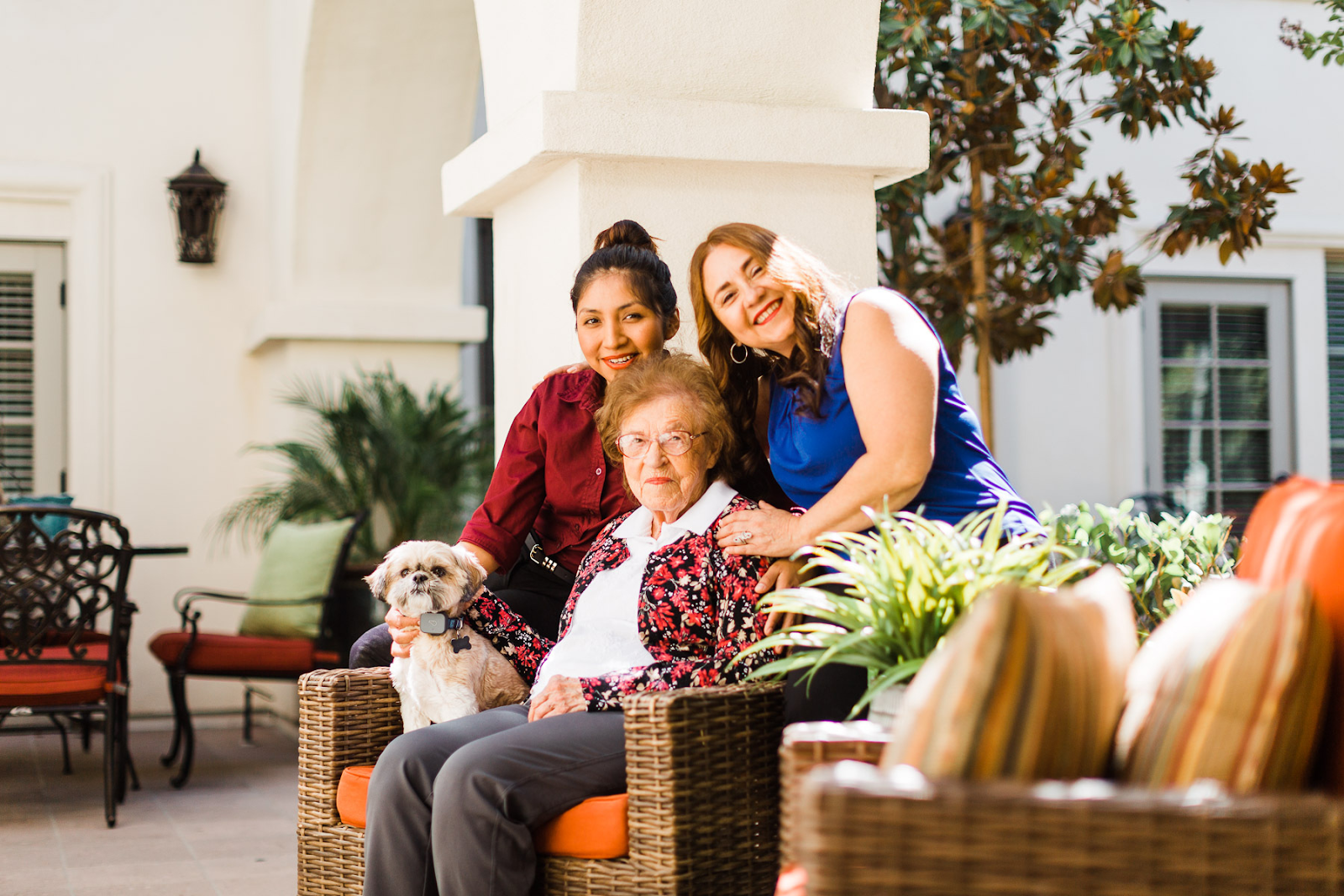When an elderly parent resists the idea of moving to an assisted living community, it can be an emotional and challenging situation for the whole family. For example, you may be faced with the dilemma, “What if my mom doesn’t want to go to assisted living?”
You likely already feel bad for suggesting the idea, and when your parent refuses it, it can lead to an emotional rollercoaster and a lack of direction.
As difficult as it may seem, it’s important to approach this transition with empathy, patience, and an understanding of the reasons behind your parents’ objections.
By taking a compassionate path forward, you can help ensure your parents receive the care, dignity, and quality of life they deserve.
Our promise is to love and care for your family as we do our own.
Understanding a loved one’s resistance to assisted living
It’s not uncommon for elderly parents to resist a move to an assisted living community.
This is a significant life transition that challenges their sense of independence, control, and emotional attachments.
As a loved one, it’s crucial to approach this situation with empathy, patience, and a deep understanding of the reasons behind their objections.
Fear of losing independence
One of the primary concerns for many seniors is the fear of losing their autonomy and the ability to make decisions for themselves.
After years of living independently, the thought of relinquishing control over their daily lives can be daunting and unsettling.
There may also be misconceptions about assisted living communities, with some seniors envisioning a hospital-like environment or a nursing home setting, which can be unappealing and contribute to their reluctance.
The emotional attachment to their current home and familiar surroundings cannot be underestimated.
For elderly parents, their home represents a lifetime of cherished memories like raising their children.
The idea of leaving behind this familiarity can be overwhelming and feel like a loss of security and comfort.
The adjustment process
A common concern when transitioning an elderly loved one to assisted living is the adjustment period. It’s natural to wonder, “How long does it take for an elderly person to adjust to assisted living?”
The answer can vary, but the adjustment process can be smoother than anticipated with patience, support, and the right approach.
Research has shown that it typically takes around three to six months for most seniors to fully adjust to their new environment in an assisted living community.
Every senior is different
This proposed adjustment timeline is not set in stone, as every individual is unique, and the adjustment period can be influenced by various factors, such as their personality, coping mechanisms, and the level of support they receive.
It’s important to note that the initial few weeks or months can be the most challenging.
Residents may experience feelings of disorientation, loneliness, or even resistance as they adapt to their new surroundings, routines, and socialization opportunities.
However, with time and the right support from healthcare professionals and loved ones, these feelings often subside as they become more familiar with their new home and begin to engage in activities and form connections with fellow residents.
Overcoming objections: Talking to your mom about assisted living
As we’ve mentioned, it’s not uncommon for seniors to reject the idea of moving. If a transition is necessary for everyone involved, it’s worth taking the extra time and care to discuss a move with your loved one.
Strategies and tips for handling objections:
- Listen without judgment: Resist the urge to argue or dismiss your loved one’s concerns. Instead, create a safe space for them to express their fears and worries openly. Active listening can help them feel heard and understood.
- Validate their feelings: Acknowledge that their concerns are valid and understandable. Reassure them that their emotions are natural and you respect their perspective.
- Address misconceptions: Many objections stem from misconceptions about assisted living communities. Take the time to educate them about the modern amenities, social opportunities, and personalized care offered in these communities.
- Involve them in the decision-making process: Rather than imposing your choices, involve your loved one in the process of researching and visiting potential communities. This sense of control and autonomy can help to alleviate some of their resistance.
- Highlight the benefits: Emphasize how assisted living can improve their quality of life by providing socialization, engaging activities, and professional care tailored to their needs.
- Seek professional support: If necessary, consider involving a trusted healthcare professional, counselor, or social worker to help navigate the conversation and provide an objective perspective.
The importance of empathy and patience
Throughout these conversations, it’s essential to maintain a compassionate and patient approach.
Understand that this resistance often stems from deeply rooted fears, such as losing independence, control, and familiar surroundings. They may even fear that their loved ones won’t visit as much if they’re in a community.
Empathy and patience are key to building trust and ensuring your loved one feels respected and heard.
Remember, the decision to move to assisted living is a significant life transition for your elderly parent.
The ultimate goal is to work together to find the best path forward for their well-being and quality of life.
The Kensington Sierra Madre’s unique approach to assisted living
At The Kensington Sierra Madre, we understand that managing the care needs of a loved one can be an overwhelming experience, especially if they need memory care.
Our community is designed to lift that burden from family caregivers by providing a truly elevated approach to memory care and enhanced assisted living services.
Our Promise and unwavering commitment to love and care for your loved ones as do our own is what sets us apart. This family-first philosophy permeates our community in every aspect, from our highly trained and compassionate team to our personalized care plans tailored to individual needs and preferences.
Experience the Kensington difference and discover a community where your family truly becomes part of ours. Schedule an assisted living tour today.



